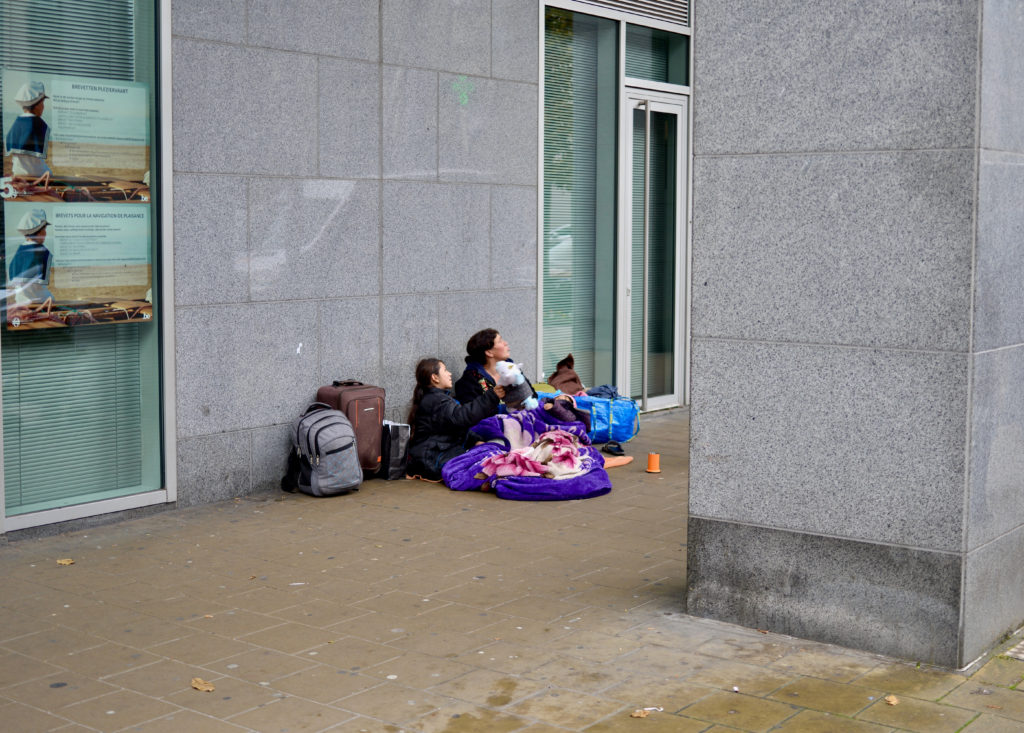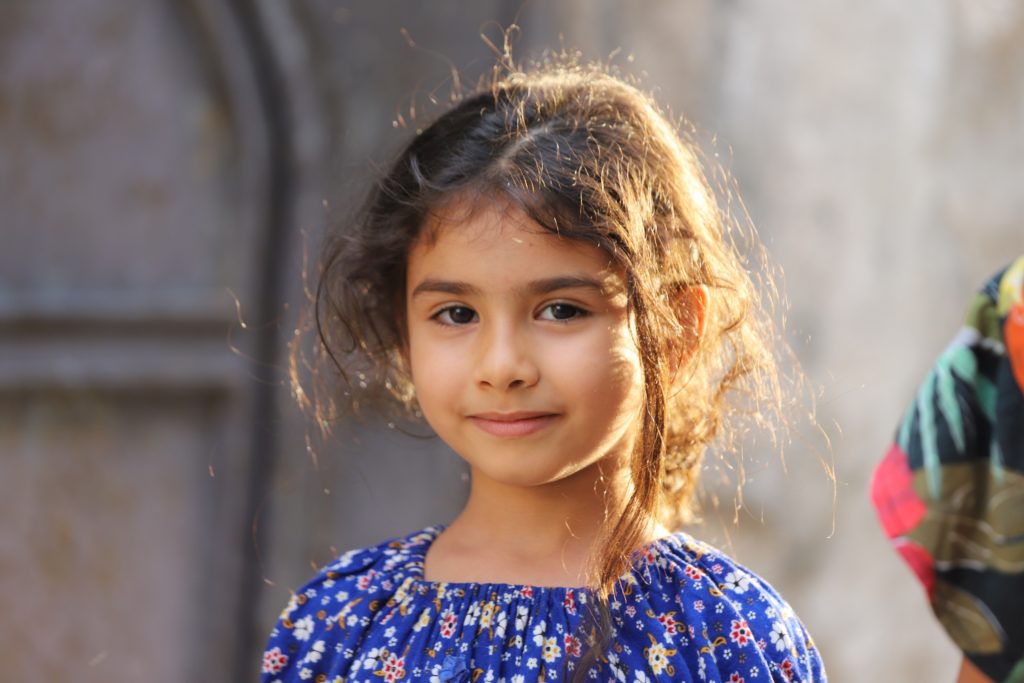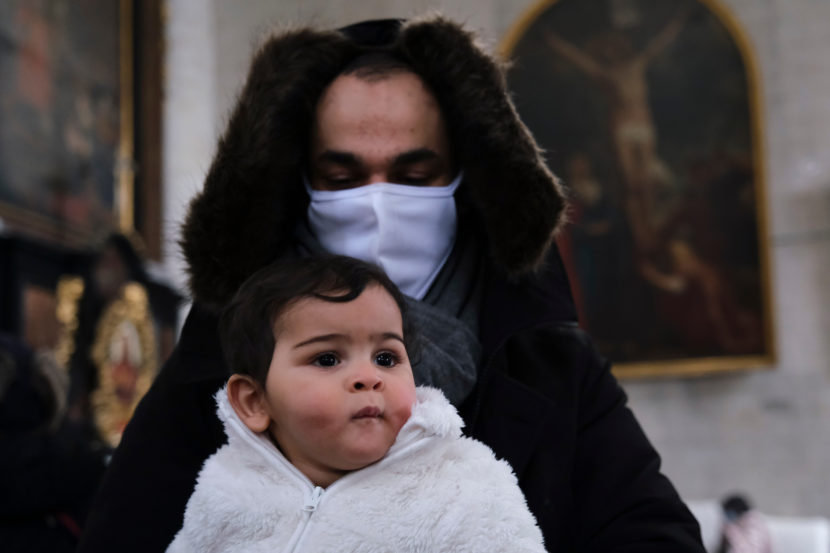Around the world, many people flee the dangers and the lack of opportunities in their home countries and arrive in European countries looking for a better and safer life. Refugees and migrants reaching Belgium face numerous challenges, including living in detention centers. Because they are placed in detention centres or reception centres, their children are faced with an even more uncertain future. Indeed, most of them do not enjoy the same rights and opportunities every child should be entitled to, such as the ability to be with their family, safe, educated and protected.
The difference between the status of a refugee, migrant and asylum seeker
- A refugee is a ‟person fleeing war, violence, conflicts or persecution, and crossing an international border in order to be safe in another country” (Belgian Federal Public Services of Foreign Affairs, 2022).
- A migrant is a ‟person permanently or temporarily moving to another region (in their own country) or to another country. This can be voluntary or out of sheer necessity” (Belgian Federal Public Services of Foreign Affairs, 2022).
- An asylum seeker is a ‟person seeking asylum in another country, that is to say asking for international protection and the right to stay because they are persecuted in their home country” (Belgian Federal Public Services of Foreign Affairs, 2022).
The arrival of refugees and migrants in Belgium
Millions of people who are victims of abuse and violence in their home country are forced to migrate to various European countries in search of a safe haven. For years, Belgium has been overwhelmed by refugees and asylum seekers arriving in high numbers (Le Monde, 2022). These people come mainly from Afghanistan, Syria, Palestine, Burundi, Guinea, the Democratic Republic of Congo and more recently Ukraine (UNICEF, 2018; Le Soir, 2023).
For many people, Belgium is the final destination of a perilous journey. In 2021, 165,534 people were reported to have immigrated to Belgium (Le Soir, 2023).
The main objective of and difference between detention centres and reception centres
Since the 1980s, Belgium has taken significant migration policy measures (Panser la justice, 2019). In this context, detention centres are used by Belgian law as a form of administrative detention for the undocumented migrants arriving in Belgium (Panser la justice, 2019).
These centres were opened in 1998 with a view to ‟detaining illegal residents and then expelling them from the Belgian territory” (Panser la justice, 2019). By placing undocumented migrants in detention centres, Belgium aimed to prevent them from escaping and ensure that deportation measures would be enforced (Panser la justice, 2019). There are currently six detention centres in Belgium (Foreigners’ Office, n.d.).

There are also ninety reception shelters in the country. The people who are placed there are entitled to ‟material help and social and medical support, and they can take a training course and engage in other activities” (Federal Agency for the reception of asylum seekers, n.d.). However, these centres do not have enough beds to provide shelter for all the refugees, migrants and asylum seekers setting foot in Belgium, which means that many people and their children have to sleep on the streets (Le Monde, 2022).
The fate of refugee and migrant children in Belgium
Refugee/migrant children arrive in Belgium in search of a safer and brighter future, but what awaits them there falls short of their expectations. In Belgium, these children can be placed in detention centres or shelters, whether they are on their own or accompanied (UNICEF, 2018; RTBF, 2021).
The first challenge they face in these centres is the uncertain and slow regularisation processes (UNICEF, 2018). Young refugees in Belgium have expressed concern about the aforementioned process, as they do not always understand ‟the details of the various processes that concern them” and feel that they ‟lack all the appropriate information” (UNICEF, 2018).
‟Going to Belgium or staying in Syria was not a matter of choice. There were issues in Syria, insecurity, war. Our lives were at risk. We had to escape, have a new life, a future.”
– a 17-year-old Syrian girl (UNICEF, 2018)
Moreover, children can feel isolated in reception centres, and most of them have expressed their wish to be reunited with the family they have been taken away from, either during their journey towards Belgium or during border controls (UNICEF, 2018). While waiting to see their family again, these children placed in centres should have a person they trust and who will be able to accompany them during their regularisation process (UNICEF, 2018).
Meanwhile, education is still essential, but recreational activities are not on offer for all the children in these centres. The children who have never been schooled before arriving in Belgium, those who have not been schooled on a continuous basis, or those who do not speak French or Dutch are faced with a lack of school opportunities (UNICEF, 2018). Refugee/migrant children have also expressed their desire to access hobbies outside the centres, which would enable them in particular to integrate into Belgian society and make friends with the locals (UNICEF, 2018).
Lastly, the teenage mothers placed in these centres in Belgium do not get the increased attention they need (UNICEF, 2018). These mothers cite a lack of independence, food, specific healthcare for their young children, safety and education meeting their needs (UNICEF, 2018).
Belgium fails to fulfill its international obligations
Belgium ratified the European Convention of Human Rights (ECHR) in 1955 and the United Nations Convention on the Rights of the Child (CRC) in 1991 (Council of Europe, n.d.; United Nations, n.d.). According to the CRC, in all decisions concerning children, the best interests of the child must be a primary consideration of the State (United Nations, 1990). The ECHR states that everyone has the right to liberty, and that imprisonment must remain an exception (Council of Europe and European Court of Human Rights, 1953).
Detention centres were initially created as an exceptional form of administrative detention. However, using these centres seems to have become a standard practice in Belgium, ‟to the point that are becoming a permanent system, set up more and more often” (Panser la justice, 2019). In addition, these detention centres in Belgium are similar to prisons, as they are equipped with ‟double rows of fencing, sometimes protected with barbed wire on top, surveillance cameras, guards, the monitoring and controlling of movements, and a set of rules providing for sanctions, such as the use of solitary confinement ” (Panser la justice, 2019).
What is even more serious is the fact that the legal framework pertaining to detention centres enables the detention of children. Between 2018 and 2019, twenty children were detained in these centres because of their migration status (Amnesty International, 2022).
That’s why, in two recent rulings, the United Nations Committee on the Rights of the Child has condemned Belgium for ‟its serious violations of the rights of the child” (Amnesty International, 2022). Although this legal framework was suspended by the Council of State in 2021 in Belgium , Belgian legislation still allows the detention of refugee/migrant children in detention centres (Amnesty International, 2022).
The justice system repressive towards refugees and migrants in Belgium must end
The Belgian State must immediately implement the following five measures: it must speed up the regularisation processes and asylum applications to avoid placing children in centres for an undetermined period of time; amend its legislation so as to not allow the keeping of children in detention centers; accelerate the procedures enabling isolated refugee/migrant children to be reunited with their families in Belgium; provide a sufficient number of available beds for refugees and migrants in reception centres so that they do not end up in the streets; and ensure that every refugee/migrant child can benefit from a protective and safe environment, appropriate health care services and access to education.

Humanium condemns this legal system allowing the detention of refugee and migrant children in detention centers. Humanium strives to create a world where children’s rights to protection, education and health are always respected. If you want to contribute to Humanium’s cause, please consider making a donation, volunteering or becoming a member.
Written by Moïra Phuöng Van de Poël
Translated by Catheline Hannier
Proofread by Alex Macpherson
Bibliography:
Agence Fédérale pour l’accueil des demandeurs d’asile. (n.d.). Les centres d’accueil. Extrait de l’Agence Fédérale pour l’accueil des demandeurs d’asile à https://www.fedasil.be/fr/les-centres-daccueil, consulté en Avril 2023.
Amnesty International. (2022, Mars 7). La Belgique condamnée pour avoir déténu des enfants migrants. Extrait d’Amnesty International à https://www.amnesty.be/infos/actualites/article/belgique-condamnee-detenu-enfants-migrants, consulté en Avril 2023.
Conseil d’Europe et Cour Européenne des Droits de l’Homme. (1953, Septembre 3). Convention européenne des droits de l’Homme. Extrait du Conseil d’Europe et Cour Européenne des Droits de l’Homme à https://www.echr.coe.int/documents/convention_fra.pdf, consulté en Avril 2023.
Conseil de l’Europe. (n.d.). La Belgique et la Cour Européenne des Droits de l’Homme. Extrait du Conseil de l’Europe à https://www.coe.int/fr/web/portal/belgianchairmanship-echr#:~:text=La%20Cour%20europ%C3%A9enne%20des%20droits%20de%20l’homme%20est%20l,ratifi%C3%A9%20ce%20trait%C3%A9%20en%201955, consulté en Avril 2023.
Le Monde. (2022, Janvier 3). En Belgique, l’accueil des demandeurs d’asile arrive à saturation. Extrait Le Monde à https://www.lemonde.fr/international/article/2022/01/03/en-belgique-l-accueil-des-demandeurs-d-asile-arrive-a-saturation_6107996_3210.html, consulté en Avril 2023.
Le Monde. (2022, Octobre 28). La Belgique débordée par des arrivées de demandeurs d’asile. Extrait Le Monde à https://www.lemonde.fr/international/article/2022/10/28/la-belgique-debordee-par-un-nouvel-afflux-de-demandeurs-d-asile_6147706_3210.html, consulté en Avril 2023.
Le Soir. (2023, Janvier 18). Asile: qui sont les 100.000 migrants arrivés en Belgique en 2022? Extrait Le Soir à https://www.lesoir.be/489701/article/2023-01-18/asile-qui-sont-les-100000-migrants-arrives-en-belgique-en-2022, consulté en Avril 2023.
Le Soir. (2023, Mars 10). Migration en Belgique: quelles nationalités et quelles raisons ? Extrait Le Soir à https://www.levif.be/belgique/migration-en-belgique-quelles-nationalites-et-quelles-raisons/#:~:text=Ainsi%2C%20en%202021%2C%20165%20534,int%C3%A9rieur%20des%20fronti%C3%A8res%20du%20royaume, consulté en Avril 2023.
Nations Unies. (n.d.). Collection de Traités – Dépositaire. Extrait des Nations Unies à https://treaties.un.org/pages/ViewDetails.aspx?src=IND&mtdsg_no=IV-11&chapter=4&clang=_fr, consulté en Avril 2023.
Nations Unies. (1990, Septembre 2). Convention relative aux droits de l’enfant. Extrait des Nations Unies à https://www.ohchr.org/fr/instruments-mechanisms/instruments/convention-rights-child, consulté en Avril 2023.
Office des étrangers. (n.d.). Les 6 centres fermés. Extrait de l’Office des étrangers à https://dofi.ibz.be/fr/themes/irregular-stay/detention/les-6-centres-fermes, consulté en Avril 2023.
Panser la justice. (2019). Centres fermés : une justice répressive envers les migrants. Extrait de Panser la justice à https://journalisme.ulb.ac.be/projets/panserlajustice/centres-fermes/, consulté en Avril 2023.
RTBF. (2021, Août 10). Détention des mineurs en centres fermés : “Ce gouvernement ne le fera pas, il faut une politique de retour qui soit humaine”, estime Sammy Mahdi. Extrait de la RTBF à https://www.rtbf.be/article/detention-des-mineurs-en-centres-fermes-ce-gouvernement-ne-le-fera-pas-il-faut-une-politique-de-retour-qui-soit-humaine-estime-sammy-mahdi-10821541, consulté en Avril 2023.
SPF Affaires étrangères. (2022, Mars 1). La Belgique fait de la migration un phénomène positif. Extrait du Service Public Fédéral des Affaires étrangères, Commerce extérieur et coopération au Développement à https://diplomatie.belgium.be/fr/politique/themes-politiques/sous-la-loupe/la-belgique-fait-de-la-migration-un-phenomene-positif, consulté en Avril 2023.
UNICEF. (2018). Les enfants migrants et réfugiés en Belgique prennent la parole. Extrait d’UNICEF à https://www.unicef.be/sites/default/files/2020-09/Les%20enfants%20migrants%20et%20r%C3%A9fugies%20en%20Belgique%20prennent%20la%20parole.pdf, consulté en Avril 2023.


